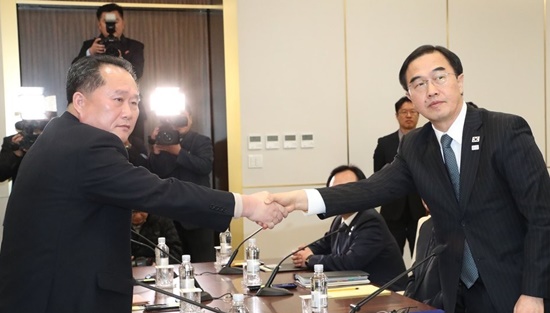Following the first high-level talks in two years between North and South Korea, the North has agreed to send athletes and an official delegation to the Pyeongchang Winter Olympic Games in February. The two sides have also agreed to hold military talks, with officials from both countries expressing a willingness to solve existing problems and reduce tensions through cooperation.
In the morning hours of the meeting, the North Korean side was already discussing their intention to send a delegation to the Olympics – a position that survived the day’s negotiations and made it into the meeting’s final joint statement. This appears to be a departure from the previous hard-line stance of the North.
The joint statement was released just before 9 p.m. at the end of the January 9 meeting between government and Olympic Committee officials. It included an agreement that North Korea would send a government delegation, athletes, a fan group, artists, official observers, a taekwondo team, and reporters, while the South would provide the necessary accommodation for the visitors.
The two sides are continuing talks on a range of practical details in regards to schedules and travel logistics, including a possible agreement to allow a team from the North to scout and inspect locations prior to the Games. Both have agreed to an exchange of documents relevant to these topics in the near future.
While many believed that the North would begin by bringing up issues such as joint military exercises with the United States, the Kaesong Industrial Complex, and further North-South economic cooperation, they were in fact primarily focused on issues related to the Olympics.
Experts are now predicting that North Korea is trying to display good-faith behavior surrounding the Olympics as a precursor to improved North-South relations and the easing of international sanctions.
Speaking with Daily NK, Cho Han Bum, senior research fellow at the Korea Institute for National Unification (KINU) said, “North Korea appears to be projecting an image of being ‘all in’ for these Olympics. There were no great difficulties as many expected and the talks went on rather smoothly. You could say the two sides have ‘broken the dam.'”
“Without a doubt, North Korea is attempting here to get around international sanctions through what they hope will be their new lifeline: South Korea. In the midst of intense international isolation, they see South Korea as representing their greatest chance of escape, so they are willing to forego demands related to the military or Kaesong and focus squarely on smooth cooperation over the Olympics,” Cho continued.
Chung Young Tae, Director of the Military Research Institute of Dongyang University, sees an irony in omitting mention of military exercises or sanctions while “still maintaining political motives behind their participation in the Pyeongchang Olympics.”
“When Ri Son Gwon expressed during the meeting’s opening statements his wish to make public the entire contents of the talks, he was trying to overtly display a ‘oneness’ of the two nations. He emphasized the games as the ‘people’s festival,’ hoping to kickstart warm inter-Korean relations on the way towards sanctions relief by first trying to positively influence public opinion,” Chung added.
Both sides did, however, agree to hold separate talks between military officials to ease the current state of heightened tensions on the peninsula.
It has been revealed that officials from the South Korean side were the first to suggest the separate military talks. North Korea likely has nothing to lose by agreeing to such talks, which the South feels are needed to address issues such as military hostilities in the DMZ and halting “cross-border slander.”
But it also appears that the North Korean side is responsible for the absence of any language in the joint statement regarding the South’s hopes for Seollal holiday reunions for separated families (coinciding with the Olympics).
North Korea may have rejected the offer due to fears that the North Koreans participating in the reunion would be able to experience firsthand the economic conditions in the South and compare them to those in the North. It would also be a very expensive endeavor to round up families scattered throughout the country and put them through education to prepare them for visiting the South.
Despite this, the two sides have agreed to continue talks on a range of issues to help ease tensions and improve inter-Korean relations through cooperation and dialogue.
Language in the final joint statement emphasizing that “Korean people” should solve “Korean Peninsula problems” has been compared to the phrase “Uriminzokkiri” (among our people, or our nation ourselves) that is heavily used by North Korea. Throughout their history, North Korea has consistently boasted of their “independence” in the face of South Korea’s ‘dependence’ on the United States. But they have also promoted a North-South-only approach as the solution to all of the peninsula’s problems, and as such, North Korea is likely to continue to put pressure on the South to choose sides – them or America – going forward.





















